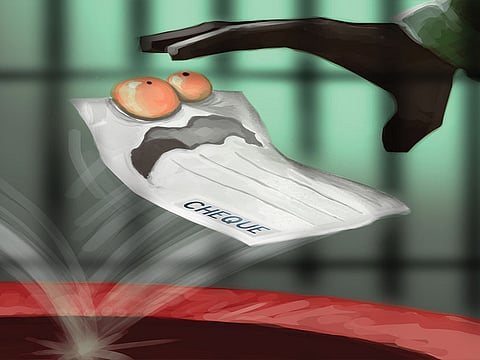Time to stop criminalising bounced cheque cases
The UAE simultaneously needs to fast-track passage of a comprehensive bankruptcy law

It is no secret that we are facing another cycle of economic slowdown since the last quarter of 2015. Capital markets are shadowed in red, the real estate market is at a standstill and retail is struggling.
It is true that this is mainly caused by turbulence in the global economy. China’s economy is showing no signs of immediate recovery in spite of all governmental efforts.
Oil prices continue to plummet with no signs of recovery soon and Russian tourism is drying up as a result of the slowdown of the economy and devaluation of the rubble. In reality, part of the problem is of confidence in the markets rather than a cashflow issue.
Investors continue to watch the markets until they see signs of recovery or at least stability.
The private sector will be under pressure during 2016 to manage costs in order to be able to survive. It needs to adopt disciplinary measures similar to those the governments have adopted recently.
However, it is true that capital is a coward and can act in weird ways at the first signs of disturbance. Therefore, it is important for governments to send assuring messages as the risk to the economy arises not from a potential crisis but from fear of uncertainty and the chaos that follows.
There are two measures that the market has long been waiting for and that are desperately needed. The first is the issue of treating a bounced cheque as a misdemeanour with the result of imprisoning issuers of such cheques.
Although there is an interest served by continuing this practice, particularly in the area of personal loans, car finance and credit cards, this interest is hugely outweighed by the damage that this practice causes to the economy.
At the first glance of any financial difficulty or a cashflow issue, businesses tend to flee leaving a circle of unpaid debts that have an impact extending throughout the market. This only happens because of the fear of imprisonment that any merchant, no matter how genuine he may be, faces when any cheque that he has issued gets bounced.
In normal circumstances, a merchant will try to reach a settlement with his creditors and reschedule his debts. A privilege that UAE businesses and merchants do not have because of the fear of being imprisoned.
Even if a merchant chooses to stay behind, the fact that he is imprisoned impedes all his efforts to reach a settlement with his creditors. In fact, creditors resist any settlement approach, even if genuine, since they know the pressure that they could exercise over the debtor who fears the risk of being imprisoned.
In many cases, genuine settlement proposals are irrationally caused to fail by creditors and which lead to the collapse of well-established businesses. In addition, creditors’ reliance on the criminal protection extended to bounced cheques causes them to relax their regular due diligence efforts and fail to take the necessary guarantees that they would otherwise require.
From a legal perspective, a cheque is merely a commercial bill and no one should be imprisoned because of failure to honour a debt. Imprisonment of defaulters is a very old practice that has been abandoned in most jurisdictions.
Furthermore, the practice of issuing and accepting post-dated cheques, which is dominant in UAE market, converts a cheque into a mere bill of exchange and which further strengthens the argument that issuing a bounced cheque should not be a criminal offence.
From a practical point of view, law enforcement agencies face a significant strain on their resources as a result of the number of the bounced cheques’ cases filed with them every year. It is not the role of law enforcement agencies to act as debt collectors on behalf of indulgent creditors who failed to exercise their due diligence.
The other pressing matter that is needed is to issue a ‘bankruptcy law’. This is a matter that has long been waited for. It is true that the UAE Federal Commercial Code has a chapter dealing with bankruptcy, but it is out of date and incomprehensive.
The mere fact that the law has hardly been used is a clear example of its deficiencies. The UAE needs a modern and comprehensive bankruptcy law that can serve the needs of its business community.
The DIFC has a modern law but its jurisdiction is limited to the geographical zone of the DIFC and the companies registered therein. In all cases, there is no real advantage from the enactment of a bankruptcy law while the issuance of bounced cheques is still deemed a criminal offence.
A protection against creditors is futile if the debtor continues to risk imprisonment.
It is true that the market has not seen a crash and I don’t believe that one will be coming. But enacting a bankruptcy law and abandoning the practice of criminalising bounced cheques are two measures that would send a strong message of confidence that the market needs sooner rather than later.
— The writer is Chairman of Baker & McKenzie Habib AlMulla.



